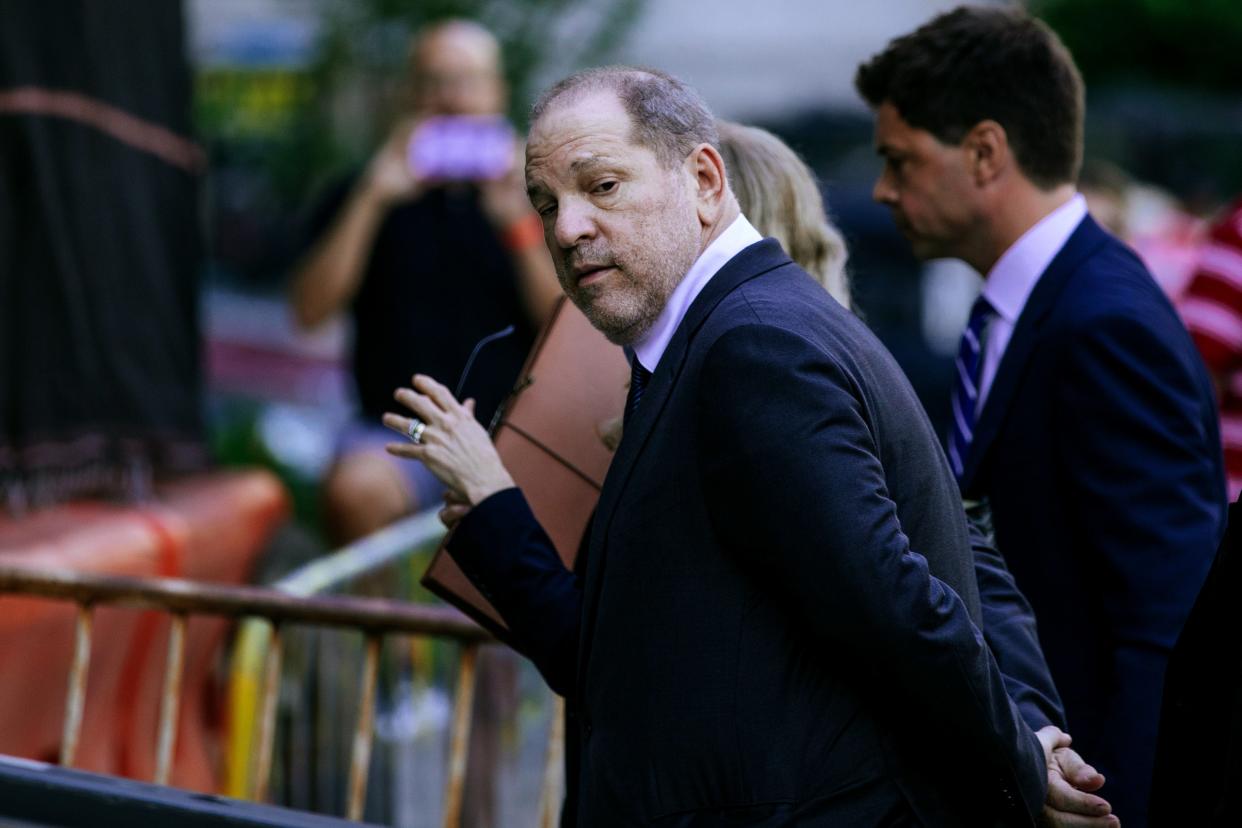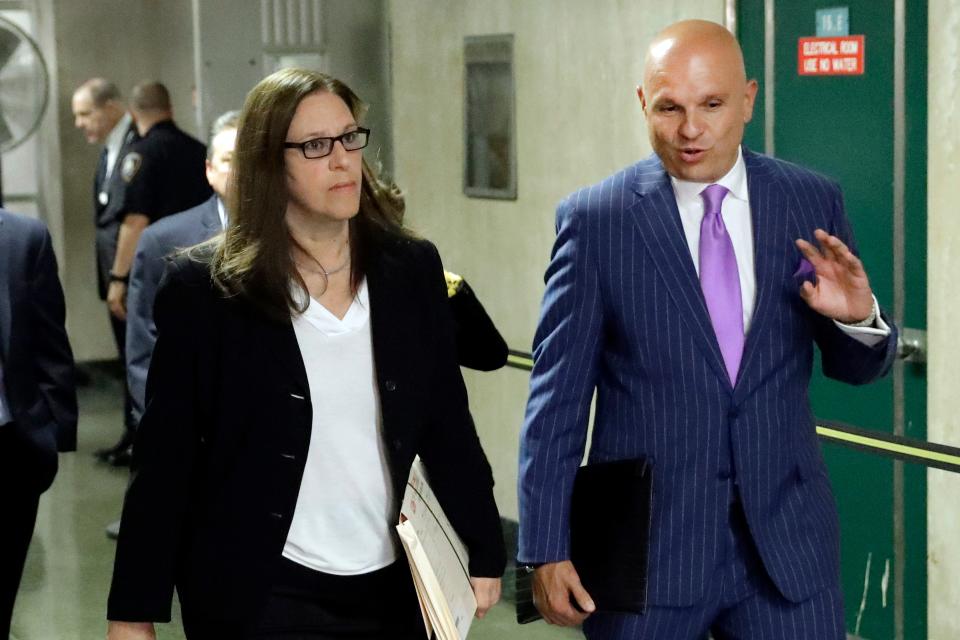Harvey Weinstein: Prosecutors go back to grand jury; will trial be delayed?

The sex-crimes trial of Harvey Weinstein, due to start Sept. 9 in New York, was in a state of uncertainty Friday as prosecutors returned to the grand jury seeking a new indictment of the fallen movie mogul – an unusual move so close to trial.
Secrecy surrounding grand jury proceedings, plus conflicting legal opinions and a gag order from Judge James Burke, who is presiding over the case, made it difficult to pin down whether this development will lead to a delay in the start of the trial only weeks away.
"I don't think anyone knows," said Arthur Aidala, one of Weinstein's lead attorneys.
"But it's a major distraction: Instead of prepping for trial, we're dealing with complex grand jury issues and it's not for the faint of heart," Aidala said. "We’re figuring it out. It's almost like a law school class on grand jury practice and procedure."
Aidala said the defense position is if there is a new indictment, the defense has 45 days to file pre-trial motions, thus delaying the trial. It's a position rejected by prosecutors, who say New York law allows them to go back to a grand jury any time before the start of a trial.
"Judge Burke has made it crystal clear he wants to start jury selection on Sept. 9," Aidala said. "But the district attorney is doing something that is not normal, not regular or typical in any way, shape or form...Seasoned defense attorneys and former district attorneys have never heard of this happening (so close to trial)."
Weinstein's other lead defense attorney, Chicago-based Donna Rotunno, told USA TODAY the prosecution's case is looking more and more disordered.
"This absolutely suggests that they are not 100% secure in this case," she said. "Running back at the 11th hour to the grand jury to reintroduce evidence a judge told them they couldn't use?..This case is a joke."
Manhattan Assistant District Attorney Joan Illuzzi-Orbon said in a letter to the judge and defense attorneys on Tuesday that prosecutors would re-present their case to a new grand jury starting on Friday in order to include the testimony of a woman who claims Weinstein raped her at her apartment in New York in the winter of 1993-1994.

The accuser did not testify before the original grand jury that indicted Weinstein; he is facing five counts of predatory sexual assault and rape involving encounters with two other so far unnamed women in 2006 and 2013 in New York. (Prosecutors have already had to drop one count and one accuser from the original indictment due to doubts about her story.)
Because this other accuser's testimony was not included in the original indictment, Judge Burke barred prosecutors from introducing her as a witness at the trial. His ruling came after a closed hearing in April about whether other accusers of Weinstein would be allowed to testify at his trial.
Illuzzi-Orbon said in her letter that prosecutors disagreed with Burke's ruling but sought to fix the problem with her testimony by going back to the grand jury. She added that the "witness in question" did not come forward until after the original grand jury concluded.
"We believe that the trial jury should have the benefit of hearing the testimony of the witness and therefore we will cure the deficiency by re-presenting the case to a new grand jury," she said in her letter.
It is not clear when a new indictment might be forthcoming but this grand jury is scheduled to end on Aug. 26. If there is a new indictment, Weinstein would have to be arraigned again, too.
The witness in question is not identified but by the description of her accusation she is believed to be "Sopranos" actress Annabella Sciorra. She told her story to The New Yorker in October 2017, well before the Weinstein grand jury was convened in 2019. According to her Instagram account, she may currently be in Italy.
But prosecutors can't charge Weinstein with a crime in connection with her accusation because it's too old under the statute of limitations in effect 26 years ago. So why do prosecutors want her to testify?
Because they have to prove "predatory" conduct – meaning that at least two women were sexually assaulted by the defendant – under the law, says Aidala. A conviction on that charge can get a defendant 25 years in prison.
"The most serious charge is predatory sexual assault and in order to prove that prosecutors have to prove that it was done on at least two occasions," Aidala said. "If you have two complainants (at trial) and the jury believes only one, then they've failed to prove predatory assault...She's their 'insurance' witness."
Rotunno says the defense position is that it's "unconstitutional" to force Weinstein to defend himself against a decades-old encounter that can't be charged as a crime in New York.
"She's going to claim that this happened 'sometime in 1993 or 1994'? How do you defend against 'sometime in 1993?' It’s ridiculous," she said. "We think (Judge Burke) could still bar them from bringing (the witness) forward based on other legal issues, too."
Among other legal differences of opinion, the defense and the prosecution disagree about what it means to "re-present" the case to a grand jury. Aidala argues that it means rehashing the entire case, including the original indictment, before a new grand jury. And it means defense attorneys get another 45 days to file pre-trial motions, thus delaying the trial start.
"It is a new indictment so we have an absolute right to file pretrial motions," Rotunno said.
Illuzzi-Orbon rejects this, saying prosecutors are ready to start on Sept. 9.
"The defense has been aware of the witnesses and charges since February 2019, therefore this new presentation should in no way cause any party to request delay," she wrote.
In another letter to the judge Thursday, Assistant District Attorney Meghan Hast also rejected the defense claim that all this is an "eleventh hour maneuver" to "re-charge the case." She said the defense knew of the witness in February and only filed a motion seeking to exclude her in June.
"The new presentation and the anticipated indictment in no way alters the charges under the Penal Law or the witnesses in this matter," Hast wrote.
This article originally appeared on USA TODAY: Harvey Weinstein prosecutors return to grand jury may delay trial

